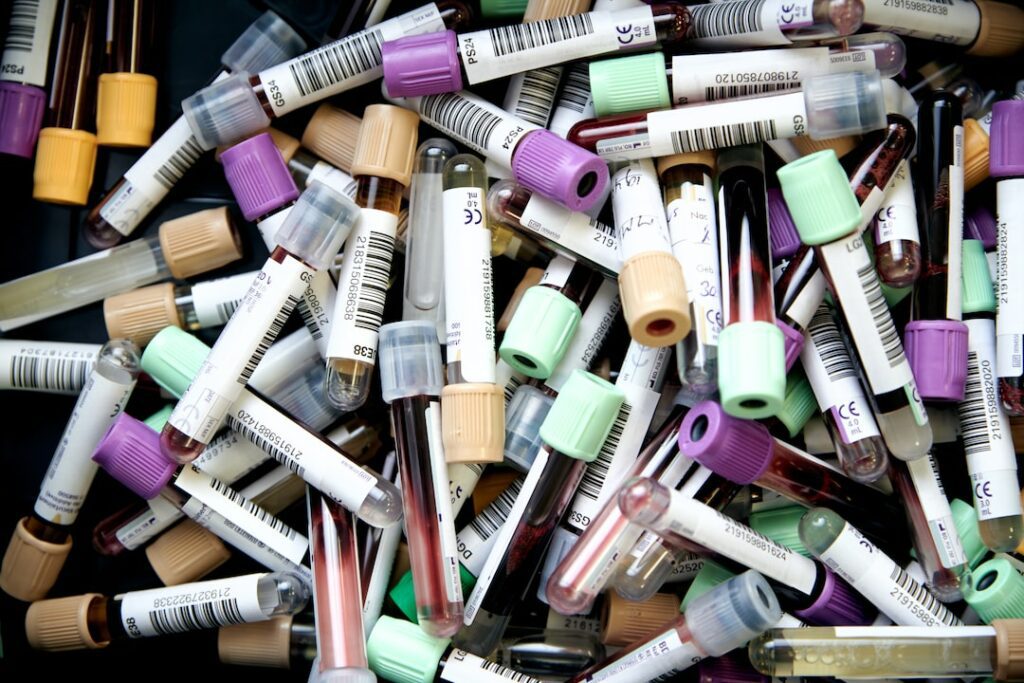
7 reasons why you need a blood test
Whether you’re trying to lose fat, gain muscle or simply feel better, the best way to achieve your goals is by having a properly functioning body.
That’s why it’s important to get regular blood tests and follow up with a functional medicine practitioner, like me, who can help you get back on track if needed. Here are some of the reasons why regular blood work is so important:
Blood tests measure how your body is working at a molecular level, including, but not limited to nutrient deficiencies.
A full blood panel measures the levels of a variety of different things in your blood. The range of molecules that can be tested is much wider than just, say, vitamin D and B12. It also measures hormones like
Testosterone and oestrogen;
Minerals like magnesium and iron;
Vitamins such as A and C;
Fats like omega-3s and cholesterol;
Proteins such as albumin (a protein produced by the liver);
Red blood cells (which comprise about 40% of all the cells in your body); haemoglobin (which carries oxygen through your body); platelets (small specialized cells that help form clots);
White blood cells; red blood cell count (the number of red cells per cubic millimeter); hematocrit (the percentage of red cells present compared to other components).
Blood testing more accurately identifies the root cause of symptoms and imbalances.
Blood testing is a great way to determine what’s happening at a molecular level. It can help you understand the root cause of symptoms and imbalances, and it can also be used to determine if you have a deficiency or if you’re getting too much of something good (or bad).
Blood tests aren’t just for people who are sick—they’re also useful for those who are simply looking to optimize their health and wellness. In fact, most health professionals recommend getting an MOT every year!
Blood testing can help you rule out things which that are similar so that you can get a better therapeutic plan.
A blood test can help you rule out other causes of your symptoms that may present in a similar way. This is why it’s important for your healthcare professional to perform routine blood tests as part of your support plan. If you have a blood test, it can help you find the best support for your condition.
It gives you a starting point for your healing journey so that you know where to begin.
If you know what’s wrong, you can start to fix it. If you don’t know what’s wrong, you can’t fix it.
Blood test results are the starting point for your health journey. They give you a snapshot of where your health is at, and where it needs to go, for optimal health and happiness. This information will help guide your journey so that when you’re ready to make a change or try something new—like eating better or taking supplements—you will have an idea of whether or not those changes are working for you.
Your blood test results may also provide valuable insight into which therapies would be best suited for helping treat any imbalances found in your body through lab testing such as hormone levels, vitamin deficiencies/excesses and other metabolic markers that could be contributing to pain issues such as inflammation levels which cause many people physical discomfort on a daily basis without even realising why.
Deficiencies can lead to inflammation and disease.
Blood tests can also help you detect deficiencies that are related to inflammation and disease. For example, anaemia can lead to fatigue, heart palpitations and dizziness. Vitamin D deficiency may cause bone pain or weakness in the arms or legs (a condition called osteomalacia). And if you have low levels of folate in your blood—a common problem for older adults—you might be at risk for a range of symptoms including depression or memory loss.
It can show if you’re eating too much of a good thing, like folate or iodine. Too much of a good thing is not always helpful.
Some nutrients are good for you in small amounts. But if you’re getting too much of them, it can cause problems with your health. Too much iodine, for example, can potentially cause thyroid problems for people with Hashimoto’s thyroiditis.
Iodine is an essential trace mineral that helps the body make thyroid hormones and keeps it healthy. Most people get some iodine if they consume seafood, seaweed and iodized salt, but if you don’t eat these foods or you are a part of certain groups who need to be careful to get enough because they have low levels of iodine in their bodies.
It’s important to diagnose deficiencies before they become long term.
Blood work is one of the most important things you can do for your health. Blood tests help to measure deficiencies in the body, which can lead to inflammation, disease and much more. If you are not measuring these deficiencies, it’s easy for them to become long-term without anyone knowing about it until it’s too late. Blood work doesn’t have to be frightening, and it’s so important to get done!
Conclusion
Blood tests are an important part of any holistic health plan. They can help you understand yourself and start your health journey with confidence. It’s important to remember that blood tests can be inaccurate if there is a deficiency or excess in other nutrients that affect the results, so it’s best to work with a qualified practitioner who knows how to interpret your results accurately in these situations. If you want more information on how this process works or need guidance in finding the right test for you, do get in touch!
